
Guy Shatters A Popular Myth That Women Speak More Words Per Day Than Men, Explains How It Was Created
You’ve probably heard this very questionable urban myth which claims that women speak twice as much as men. But like most urban legends, it spreads mouth to mouth without giving much of a solid argument to back it up.
And Abraham Piper, an artist from Minneapolis, Minnesota, took it to his 839.6k followers on TikTok to debunk the myth and explain where it is coming from. Abraham’s illuminating video amassed 1.9M views as many viewers felt like the myth was thoroughly busted.
It turns out, all it took was one, according to Abraham, “mega-famous conservative Christian psychologist” stating “research makes it clear” that women speak twice more words than men. Thanks to Abraham, we have an excellent reminder that things should always be taken with at least a grain of salt and sometimes, a bag of it.
Artist Abraham Piper debunked an urban myth that women speak twice as much as men in his viral TikTok video
@abrahampiper#WeirdHistory of a #sexist#language#fact. // #linguistics#sexism#mythbusting#urbanlegend#propaganda#exvangelical#nonreligious♬ original sound – Abraham Piper
Image credits: abrahampiper
Image credits: abrahampiper
Image credits: abrahampiper
Image credits: abrahampiper
Image credits: abrahampiper
Image credits: abrahampiper
Image credits: abrahampiper
Image credits: abrahampiper
Image credits: abrahampiper
Image credits: abrahampiper
Image credits: abrahampiper
Image credits: abrahampiper
Image credits: abrahampiper
Image credits: abrahampiper
Image credits: abrahampiper
Image credits: abrahampiper
The stereotype that women talk more than men has long been fostered by pseudo-scientific literature which made sexist conclusions about the way men and women communicate. Often, they claim that difference resides on a fundamental level that allegedly separates female and male minds.
With the publications of John Gray’s “Men Are from Mars, Women Are From Venus” and Deborah Tannen’s “You Just Don’t Understand,” these ideas escalated and spread unquestioned. In “The Female Brain,” published in 2006, Louann Brizendine, M.D. stated that women say about 20,000 words a day, while men say about 7,000. This only strengthened the already flawed stereotype and fueled it further.
Meanwhile, Mark Liberman, a linguistics professor at the University of Pennsylvania, decided to investigate the research that supported such a claim. Catherine Aponte, a former clinical psychologist and an adjunct professor at Spalding University, explains that there were some underlying flaws in the statement. “What he found was that the statement about how much men and women talk came from a self-help book, with no academic citation referencing the statement. Reviewing similar assertions yielded word counts for women ranging from 4,000 to 25,000 words, again with no research supporting such statements.”
Aponte further explains the situation that formed around the myth: “Brizendine retracted her statement when Liberman pointed out his research in a newspaper article, saying the statement would be deleted from future editions.”
However, according to Aponte, the damage was already done. “This much-publicized, stereotypic sound bite will linger in people’s memories and get recycled in conversations. The retraction will not make the same impression. This is how myths about men and women acquire the status of facts.”
And this is what people had to comment on it
Myt ake on this remains: "And if it's true, 19,000 of those words are, 'Please listen to me'." ....
I'll never forget the scenes during lunch time, hanging at work with men and women colleagues... Guess who's the group that talks the most when we're mixed up... yeah, men. Nothing wrong with this in general, it's just... I don't know how people believe this. My brother also talks more than one of my sisters and me. And I've witnessed so many men either interrupting or not even letting women to talk because they have so much to say, the poor women just patiently gave up waiting for their turn. At school as well, boys were the ones talking more during lessons, in average, not by rule. And finally, me, I speak exceptionally little. I'm the type who quietly sits in a corner when hanging out in groups. Talking is good, don't be afraid to talk too much, but this myth? How? Why? Absolute nonsense. Ironically, I ended up writing a long comment. ♡
Wouldn't it go by person to person? Some men talk a lot, some barely talk at all and the same goes for women. It's not gender specific.
Seems like it. Also what job you have and if you’re in a relationship, if you have a close friend, etc. Also could be influenced by the decade and your income (a person with good income in 2001 would have more minutes of talk time than a poor person in 2001, back when we paid by minute for cell phone use) so they’d be able to talk more.
Load More Replies...Myt ake on this remains: "And if it's true, 19,000 of those words are, 'Please listen to me'." ....
I'll never forget the scenes during lunch time, hanging at work with men and women colleagues... Guess who's the group that talks the most when we're mixed up... yeah, men. Nothing wrong with this in general, it's just... I don't know how people believe this. My brother also talks more than one of my sisters and me. And I've witnessed so many men either interrupting or not even letting women to talk because they have so much to say, the poor women just patiently gave up waiting for their turn. At school as well, boys were the ones talking more during lessons, in average, not by rule. And finally, me, I speak exceptionally little. I'm the type who quietly sits in a corner when hanging out in groups. Talking is good, don't be afraid to talk too much, but this myth? How? Why? Absolute nonsense. Ironically, I ended up writing a long comment. ♡
Wouldn't it go by person to person? Some men talk a lot, some barely talk at all and the same goes for women. It's not gender specific.
Seems like it. Also what job you have and if you’re in a relationship, if you have a close friend, etc. Also could be influenced by the decade and your income (a person with good income in 2001 would have more minutes of talk time than a poor person in 2001, back when we paid by minute for cell phone use) so they’d be able to talk more.
Load More Replies...
 Dark Mode
Dark Mode 

 No fees, cancel anytime
No fees, cancel anytime 



















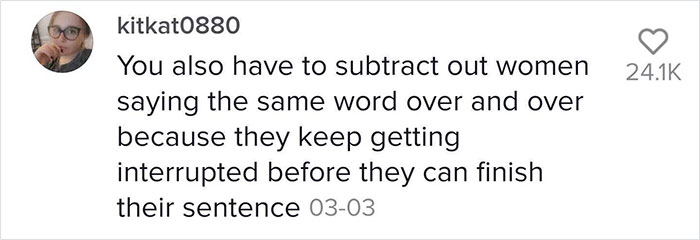

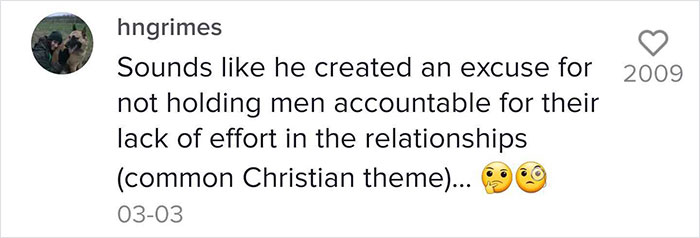
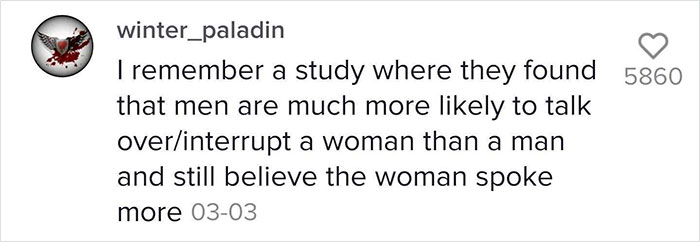
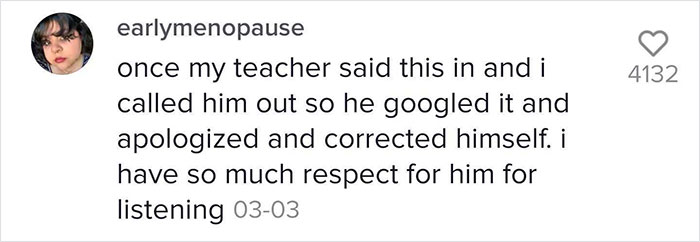
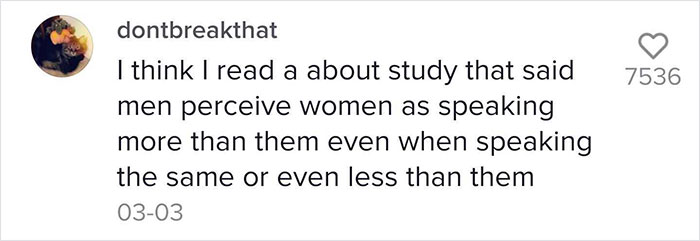
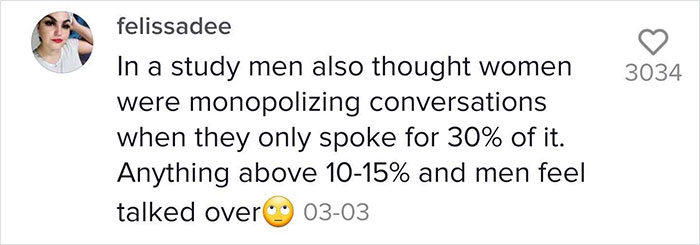

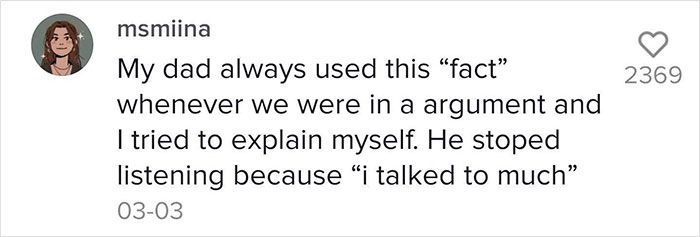
































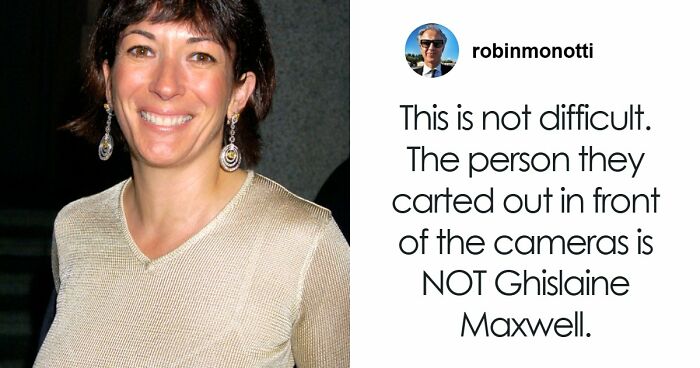











164
105